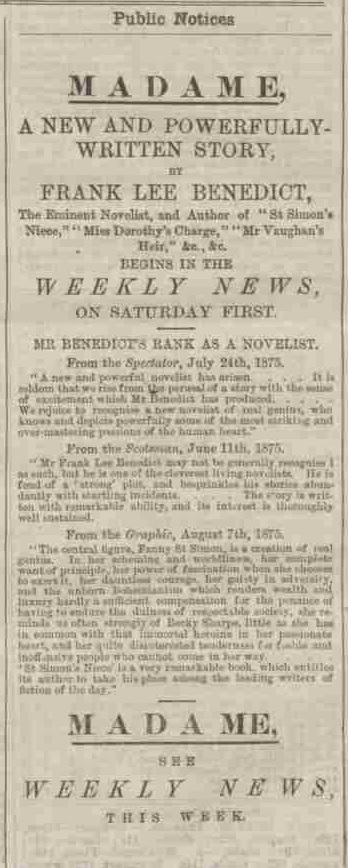Serialised fiction in the Bolton Weekly Journal – Madame (1875-76) by Frank Lee Benedict

Frank Lee Benedict 1834-1910 is an American novelist and one of his novel’s Madame (1876) was first serialised in the Bolton Weekly Journal, appearing in weekly instalments between October 1875 to July 1876 (Bassett, 2020).
As is typical of sensation fiction, the leading lady of the novel, Madame Jostram is summarised by a “beautiful wonderfully youthful looking woman, of great genius and enormous wealth” (Anon 1876, p.335). An anonymous reviewer for The Athenaeum wrote that “Madame is a really good second-class novel, with an interesting, if occasionally somewhat improbable plot”. The reviewer comments that “there is a good deal of excitement and mystery in the story, and the reader does not even begin to entertain suspicions as to one important point till near the end” (1876, p.335).
Another anonymous reviewer for the Saturday Review is not so kind; they comment that “it is easy to believe that novelists less celebrated posses the same happy power of oblivion in a greater degree, and that in their rapid workmanship they so completely cease to remember what has passed from their brains that they never at any moment take a general view of their romance”. This theory is used as an explanation for “the fact that a writer of some reputation like MR. F. Lee Benedict has ventured to present to the world a tale so tedious, rambling, and improbable as Madame” (1876, p.517).
The reviewer was not exactly complimentary about Benedict’s characters either, commenting that “an old maid always spoken of as flower, whose sayings and doings are almost too offensive to be quoted.” According to the reviewer “she drinks too much sherry she “squeals as if she had an engine-whistle somewhere in her enthusiastic inside”; and we fancy that MR Benedict libels his own country-women when he makes those specimens of “knicker box exclusiveness.” The playful banter of MR Benedict’s American family when they are talking to each other makes one blush with humiliation at the mere reading of such vulgar ineptitude” (1876, p.517).
Sensation fiction undoubtedly made a stir during the Victorian era when it first became popular in 1860. Researching reviews such as these highlights the mixed feelings towards this type of fiction. The female characters of these novels were often “beautiful, clever, young” and just like Madame Jostram in Madame “adept at disguise and deception- such women are doubly dangerous and generate social instability because they posses and threaten to use secret knowledge” (Allingham, 2016). You can learn more about the history of sensation fiction by clicking the link here: https://victorianweb.org/genre/sensation.html

Bibliography
Allingham, V.P. (2016) The Victorian Sensation Novel, 1860-1880- “preaching to the nerves instead of the judgement” [Online] Victorianweb.org. Available at: https://victorianweb.org/genre/sensation.html [Accessed 15 April 2021].
Bassett, T. (2020) At the Circulating Library Author information: Frank Lee Benedict. [Online] Victorianresearch.org. Available at: http://www.victorianresearch.org/atcl/show_author.php?aid=346 [Accessed 15 April 2021].
Bassett, T. (2020) At the Circulating Library Title information: Madame. [Online] VictorianResearch.org. Available at: https://www.victorianresearch.org/atcl/show_title.php?tid=2027&aid=346 [Accessed 15 April 2021].
Benedict, Frank L. (1874) Mr. Vaughan’s Heir: A Novel. London: Samuel Tinsley.
Saturday review of Politics, Literature, Science and Art. (1876), 42(1095), pp.517-18. London. Available at: https://search-proquest-com.ezproxy.bolton.ac.uk/docview/9644794/4D09C1B2CFA64797PQ/2?accountid=9653&imgSeq=1 [Accessed 15 April 2021].
The Athenaeum: Heronshaw; or Modern Thought, (1876). (2550), pp.335-36. London. Available at:https://search-proquest-com.ezproxy.bolton.ac.uk/britishperiodicals/docview/9054996/1A326F77B1B74BF4PQ/11?accountid=9653&imgSeq=2 [Accessed: 15 April 2021].










